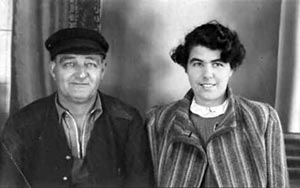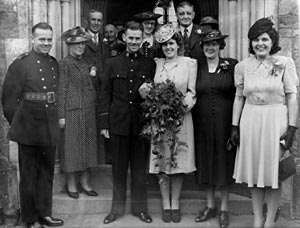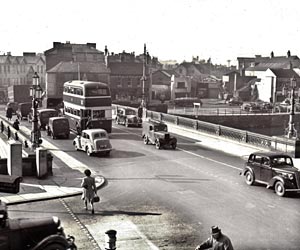
Exeter Stories
Exeter folk and friends in their own words - │ << Previous story │ Next story >> │
Tony Lethbridge - bombs over Exwick
My grandparents Bill and Kathleen White moved to Exeter from London during the Great War as a result of my grandmother being shell shocked by the Zeppelin bombing raids. They lived at first in North Street, then at 35 Bonhay Road before moving to Mildmay Close in the thirties.
Bill worked for the Great Western Railway as a delivery driver and they had two daughters Pat, my mother, and Kathleen known as Kit. Following the outbreak of war there was much talk of air raid precautions, as a result of which Bill decided to build a shelter in the playing fields at the bottom of his garden. This was a trench lined and covered with old carpets which afforded simple protection for the family and their neighbours. The old carpets had been given to Bill by a shopkeeper to whom he delivered stock. The carpets had evidently been in storage a long time as following the first alert those taking shelter had emerged in a very dusty and grubby condition. Prior to the trench being dug Kathleen insisted on taking shelter in the toilet which was situated under the stairs in their house. She was so frightened that she totally failed to realise the danger of sitting directly beneath a cast iron cistern!
The rush to reach the shelter when the siren sounded led to several humorous incidents. On one occasion during summer a neighbour hurrying across his garden was heard to shout with pain. In his haste to reach the shelter he had not first pulled his boots on and unfortunately trod on his wife’s knitting needles which she had earlier left by her deckchair in the garden. On another occasion Bill went to chivvy a neighbour, Mrs Milliken, who lived at the top end of Mildmay Close and was unusually slow in reaching the shelter. Mrs Milliken was tottering down the path, crying ‘Oh Mr White, I’ve got both legs down one leg of me drawers.’
The Exwick Spies
Pat was a member of a local rambling club. In the early days of the war a new couple joined the group. Neither the man or the woman were know to the other members but attracted attention by asking numerous questions about the places they visited and also for their enthusiasm for photography. Suspicion grew and eventually the couple were reported to the police and never seen again. Spies? Perhaps.
Exeter was raided seventeen times by enemy bombers between August 1940 and December 1942, but the sirens also sounded frequently as raiders passed overhead on their way to numerous other targets in England and Wales. Life in the trench was not all fun. Pat and her father always stood at the entrance to the shelter and during the main raid of the Exeter Blitz in May 1942 she vividly recalled watching Webber’s timber store in Bonhay Road (now the modern flats near the Mill on the Exe) burning fiercely.
Disturbing the dead
She also remembered her father quietly point skywards to a parachute drifting silently above them. This was a land mine, a large metal container of high explosive attached to the parachute, and they watched awestruck as it fell to earth in the cemetery close to Exwick Road. The massive explosion blew grave stones, coffins and human bones high into the air. Gruesome debris was strewn for some distance in all directions . Clearly this incident was kept under wraps by the censor as I have only found one very brief reference to it and would like to know the exact date of the incident..
Mother does some fire watching
Pat undertook various forms of war work. She was a member of the Auxiliary Fire Service, and also, with her mother in law, Mrs Fanny Lethbridge, saw service as a fire watcher on St Thomas railway station, helped look after evacuee children on their arrival in Exeter ( the children were taken to the museum in Queen’s Street until suitable accommodation was found for them) and assisted with the running of a canteen for service personnel on St David’s station. The railway was frequently targeted by the Luftwaffe and in one raid eight railwaymen were killed when an air raid shelter at Red Cow Crossing received a direct hit. Pat remembered low flying raiders machine gunning railway staff as they ran for cover. Later in the war a fight broke out on one of the platforms at St David’s between American soldiers in which a black GI was stabbed to death. Due to the blackout the lighting was very dim, no one saw the incident and the culprit was never found.
Pat married my father, Ted Lethbridge, at St Andrew’s Church, Exwick on 15 July 1942, less than two months after the Exeter blitz. By that time she was working in the family business J.Lethbridge & Sons at 183 Cowick Street. Ted was away serving in the army, but his brother, Dick, was a station officer in the National Fire Service who had helped fight fires during the blitz on Plymouth and Bristol as well as other major centres. As far away as Birmingham.
The Baedeker Raids
The first of the Baedeker raids on Exeter took place on Sunday 23 April when forty five enemy aircraft, including Dornier 217s, Junkers JU88s, and Heinkel 111s, flew from airfields in northern France only to find the city covered by low cloud. A single plane managed to find the target and dropped its payload of four bombs which hit Okehampton Street and Alphington Street in close proximity to the railway line. Five people were killed in the raid including an elderly couple whose house backed on to Lethbridge’s shop.
Pat was on duty in the control room at Danes Castle fire station during this raid. The fire girls had taken shelter under a table but when the all clear sounded the officer in charge said that they could go to bed. At that point an excited dispatch rider arrived at the fire station and told Pat “Your place is bombed flat!”
Knowing that my grandmother was alone above the shop she immediately sought permission to go home. Dick Lethbridge was just about to leave with a fire engine to deal with a bomb that had fallen near Ide so Pat, clutching her steel helmet on her head, clung on as the fire engine, with bell ringing, roared down Fore Street Hill. On arrival in Cowick Street she was greeted by a huge omelette pouring out from under the double doors next to the shop front. The rear of the premises housed an egg packing station and thousands of eggs had been smashed by the blast from the bomb which had blown out the back wall.
Fortunately my grandmother had taken Pat’s advice and gone down stairs when the siren sounded. Her bedroom was above the passageway which led to the egg packing station, and the window had been blown in leaving huge shards of glass embedded in the pillows and mattress of the bed. Mrs Lethbridge had put on her best fur coat and taken shelter in the kitchen so alas was covered from head to foot in soot which had blown down the chimney. Thankfully she was otherwise unhurt.
Earlier in the evening Pat had noticed that her pet cat, which had recently had kittens, had climbed to the top of a stanchion in this wall and had tucked the kittens under the eaves of the roof. Pat fetched a ladder and brought them down but immediately the cat climbed back. After a couple of failed attempts Pat gave up, in the morning this was the only part of the wall still standing and the cat and her kittens survived..
© 2008 Tony Lethbridge
Tony Lethbridge has lived in Exeter all his life, and his family ran a butchers shop in Cowick Street for many years. Tony is the city's foremost expert on the Exeter Falcons and has written several books about them.
 Bill White worked for the GWR, while his daughter, Pat, was a
member of the Auxiliary Fire Service.
Bill White worked for the GWR, while his daughter, Pat, was a
member of the Auxiliary Fire Service.
 Pat and Ted Lethbridge on their wedding day at St Andrews Church,
Exwick.
Pat and Ted Lethbridge on their wedding day at St Andrews Church,
Exwick.
 The gap in the buildings to the right of the bus is where the bomb
dropped behind the Lethbridge shop.
The gap in the buildings to the right of the bus is where the bomb
dropped behind the Lethbridge shop.
│ Top of Page │